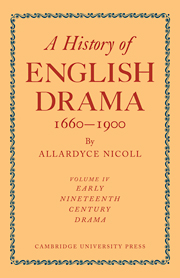Book contents
- Frontmatter
- PREFACE
- Contents
- PART I
- Chapter One THE THEATRE
- Chapter Two THE DRAMATIC CONDITIONS OF THE AGE
- Chapter Three THE ILLEGITIMATE DRAMA
- Chapter Four THE LEGITIMATE DRAMA
- Chapter Five THE STILL-BORN DRAMA
- Chapter Six CONCLUSION
- SUPPLEMENTARY NOTES
- Appendix A THE THEATRES, 1800–1850
- PART II
- SUPPLEMENTARY NÓTES TO THE HAND-LIST OF PLAYS 1800–1850
- INDEX OF PERSONS AND SUBJECTS
Chapter Two - THE DRAMATIC CONDITIONS OF THE AGE
Published online by Cambridge University Press: 07 October 2011
- Frontmatter
- PREFACE
- Contents
- PART I
- Chapter One THE THEATRE
- Chapter Two THE DRAMATIC CONDITIONS OF THE AGE
- Chapter Three THE ILLEGITIMATE DRAMA
- Chapter Four THE LEGITIMATE DRAMA
- Chapter Five THE STILL-BORN DRAMA
- Chapter Six CONCLUSION
- SUPPLEMENTARY NOTES
- Appendix A THE THEATRES, 1800–1850
- PART II
- SUPPLEMENTARY NÓTES TO THE HAND-LIST OF PLAYS 1800–1850
- INDEX OF PERSONS AND SUBJECTS
Summary
The Reasons of Decline
In the preceding sections many matters of interest have been rapidly hurried over. It is now time to consider the relations of some of the facts observed to the general dramatic debility of the half-century. Concerning the existence of this debility no one was, or is, in doubt. On all sides we can hear the cries, now monstrous pitiful like Bottom's roar, now stern-lipped with would-be grandeur, declaiming on the weakness of the time. The difficulty is not to recognise the phenomena but to trace to their sources the underlying causes. It is not sufficient to talk glibly of the general retrograde movement in drama from the times of Shakespeare; the day has passed for such generalisations. Nor may we hastily label the Romantic era as “lyric” as distinguished from the “dramatic” spirit of Elizabethan England. The Romantic poets may have been intensely lyrical in the sense that they were continually writing and speaking of themselves, but the lyric poets were not the only authors of that age, and their failure is only part of the general failure of the age as a whole.
On surveying this period, one fact strikes us at once; the presence of three distinct types of authors, or rather the production of three distinct types of plays. The great mass of nineteenth century dramas are the melodramas, farces, spectacles and extravaganzas turned out in their hundreds by the Planchés and the Fitzballs.
- Type
- Chapter
- Information
- A History of English Drama 1660-1900 , pp. 58 - 99Publisher: Cambridge University PressPrint publication year: 1955



